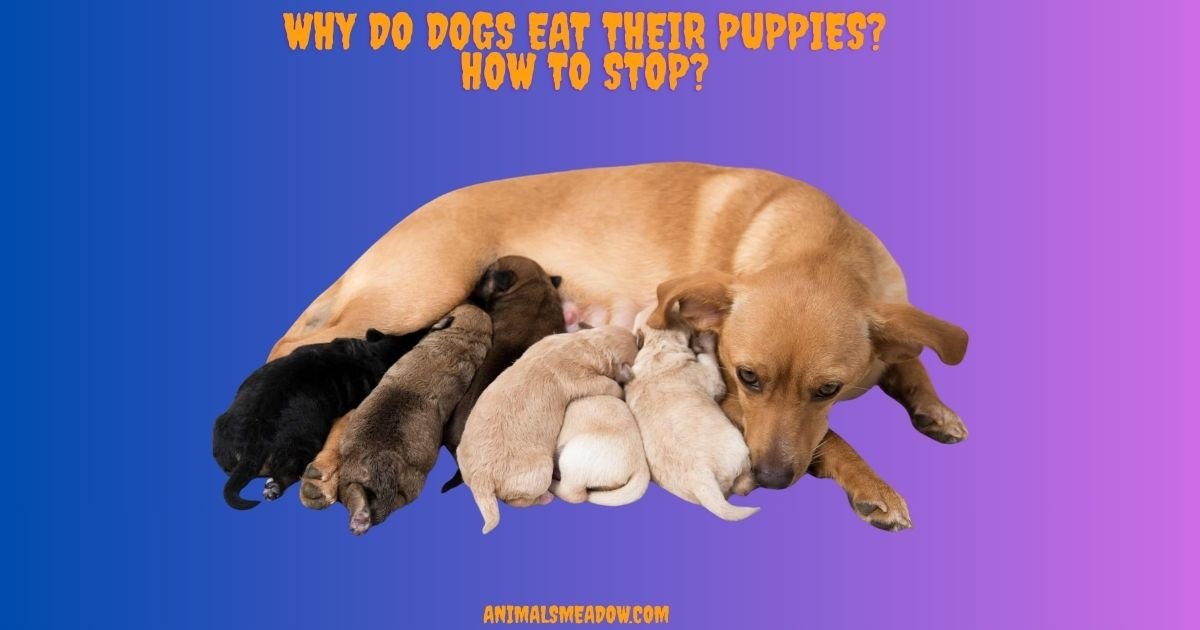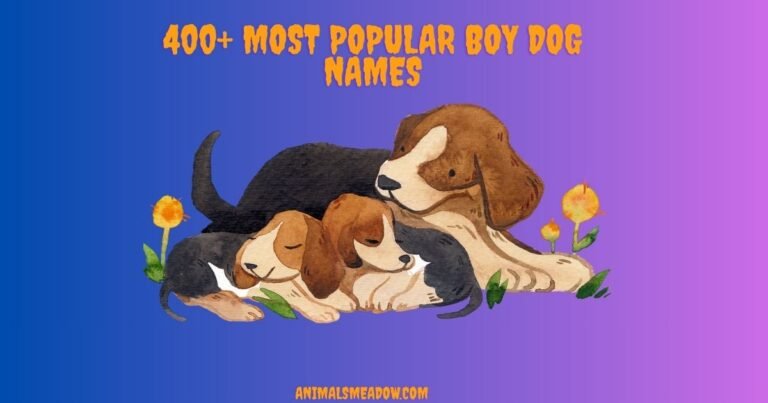Why Do Dogs Eat Their Puppies? How to Stop?
We discuss some reasons Why Do Dogs Eat Their Puppies? Did you know that in some cases, a mother dog may resort to eating her own puppies?
While this behavior can be shocking, it’s often rooted in instinctual reactions to stress, hunger, or even health issues.
Understanding why this happens is crucial for dog owners who want to ensure the well-being of both the mother and her litter. In this article, we’ll explore the various reasons behind this distressing behavior and provide actionable tips on how to stop dogs from eating their puppies.
Why Do Dogs Eat Their Puppies?
Here we discuss some common reasons why dogs choose to eat their puppies.
Accidentally Eating the Puppy
In the raw and instinctive world of canine motherhood, the phenomenon of a mother dog accidentally eating her puppy can be both shocking and perplexing. This behavior often stems from the deeply ingrained survival instincts that guide a mother in the wild.

While it’s easy to interpret this act as a sign of negligence or cruelty, it’s essential to understand that dogs are wired to respond to their environment in ways that maximize their offspring’s chances of survival. By consuming stillborn pups, they not only eliminate potential threats to the health of the living puppies but also reclaim valuable nutrients.
This instinctual behavior raises profound questions about the nature of maternal care in animals, highlighting how instinct and survival can sometimes lead to tragic outcomes. Understanding why dogs eat their babies provides deeper insight into the complex emotional and instinctual world of canine mothers, revealing the delicate balance between nurturing and survival in the animal kingdom.
Hunger or Malnutrition
While the thought of dogs eating their puppies may evoke shock and sadness, it’s crucial to understand the underlying factors that can lead to this rare behavior. A mother dog, particularly one nursing a large litter, faces an immense caloric demand; for every puppy she nurses, her diet should increase by about 25%.
This means that a beagle with seven puppies requires a staggering 175% more food than usual. When a mother dog is unable to find sufficient nutrition, her instinctive survival mechanisms may kick in, leading her to make desperate choices in a struggle for sustenance.
Regularly monitoring her health and appetite, along with ensuring an adequate supply of high-quality food, not only supports her well being but also fosters a nurturing environment for her puppies. Understanding these dynamics not only deepens our bond with our pets but also reinforces our role in safeguarding their maternal instincts and the lives of their young.
Doesn’t Identify the Puppy
When a female dog undergoes a C-section, the lack of natural birthing processes can disrupt the hormonal cascade essential for maternal bonding. Oxytocin, often dubbed the “love hormone,” plays a crucial role in helping mothers recognize and nurture their young. Without this hormonal surge during labor, the mother may not only fail to identify her puppies but also exhibit behaviors that seem perplexing to us, such as rejecting or even eating them.
This instinctual behavior can stem from confusion or stress, as the mother might perceive her offspring as vulnerable prey rather than her beloved young.
Understanding why some dogs eat their puppies requires delving into their primal instincts. In the wild, a mother might eliminate weak or sickly offspring to ensure the survival of the fittest. When a dog does not form a bond with her puppies, she may instinctively resort to this survival mechanism.
Suffering From Mastitis
Mastitis is more than just a physical ailment; it can profoundly impact the bond between a mother dog and her puppies. When a mother experiences this painful infection, not only do her teats become red and swollen, but the emotional strain can lead to distressing behaviors, such as neglecting or even eating her puppies.

This drastic reaction often stems from overwhelming pain and discomfort, as instinctively, she may perceive that her milk is harming her young ones. Understanding this behavior can help owners navigate the complexities of caring for a nursing dog facing mastitis.
As a pet owner, it’s essential to monitor your dog’s condition closely. If she exhibits signs of distress or if the puppies are struggling to nurse due to her discomfort, consulting a veterinarian should be your first step. In the meantime, providing a bottled milk formula can ensure the puppies receive adequate nutrition without further stressing their mother.
Read Also: 300+ Fox Names With Meanings: Cute, Cool & Unique Names
Stress
The journey of motherhood can be a tumultuous one, especially for first-time mothers who navigate the complexities of pregnancy and childbirth. Stress during this period is not uncommon; it can manifest in various ways, affecting both the physical and emotional well being of the mother. This phenomenon isn’t limited to humans. Dogs, too, experience stress that can have profound effects on their behavior and interactions with their puppies.
When a dog is under stress, it may exhibit signs of anxiety such as growling, barking, or even aggressive behaviors like biting its own puppies. This raises an unsettling question: why do dogs eat their own puppies? In some cases, stressed mothers may resort to this instinctual behavior as a means of survival, driven by the overwhelming pressures they face.
The stressors could range from environmental changes, lack of support, or even an inability to care for all their offspring adequately. Understanding these dynamics offers valuable insights into the emotional lives of animals and highlights the importance of creating a nurturing environment for both new mothers and their pups during such critical times.
Inexperienced Motherhood
Inexperienced motherhood in dogs is a poignant issue that often arises when young females become pregnant during their first heat cycle. At this tender age, both the mother and her puppies are at risk; a young dog may lack the maternal instincts and knowledge required to care for her newborns effectively.
This lack of experience can lead to troubling behaviors, including the heartbreaking phenomenon of why do dogs eat their own puppies? In extreme cases, a stressed or confused young mother may resort to this tragic act as a means of coping with her overwhelming situation.
Moreover, the environment in which some dogs are bred exacerbates these challenges. In puppy mills, where profit often supersedes compassion, mothers are frequently forced into repeated pregnancies without adequate care or support. These conditions not only jeopardize the health of the mother but also deprive her of the nurturing instincts she needs to raise her young.
Mercy Killing
What is Mercy Killing? Mercy killing, often referred to as euthanasia, is the act of intentionally ending a life to relieve suffering. In the context of animals, such as a mother killing a deformed or weak pup, it can be seen as a controversial yet instinctive behavior driven by natural selection.

Mercy killing in the animal kingdom often raises eyebrows, yet it can be a deeply instinctive action rooted in survival. When a mother dog senses that one of her puppies is unhealthy, perhaps suffering from respiratory issues, congenital defects, or severe infections she may instinctively choose to eat that pup.
This behavior, while shocking to humans, is driven by an innate desire to protect her remaining offspring. The mother recognizes that an unhealthy puppy not only struggles to thrive but may also pose a risk to the health and well-being of its siblings by spreading illness.
Related: 350+ Bulldog Names for Your Kind and Courageous Pet
How to Stop the Mother Dog From Eating Her Puppies?
Here we discuss three top ways: How to Stop the Mother Dog From Eating Her Puppies?
Veterinarian Examination
A veterinarian examination is an essential step in ensuring the health and well-being of both the mother dog and her puppies, particularly when addressing concerns like how to stop a mother dog from eating her puppies.
Regular vet visits allow for early detection of any underlying issues that may lead to maternal stress or behavioral problems. The vet can provide guidance on creating a calming environment, which is critical for the mother’s mental state during this vulnerable time.
If you notice weak pups in the litter, don’t hesitate to consult your veterinarian for tailored advice. They may recommend specialized nutritional support or supplements to boost the health of both the mother and her weaker offspring.
Observe the Mother Frequently
Observing your mother dog closely is essential for ensuring her well-being and the health of her puppies. Pay attention to her interactions with her litter; signs of stress or anxiety can manifest in various ways, such as excessive barking, restlessness, or even neglecting her pups.

A mother dog that seems overly aggressive or disinterested in nursing may need immediate intervention. To prevent potential issues like how to stop a mother dog from eating her puppies, it’s crucial to monitor her behavior continuously, especially during the first few weeks after giving birth when maternal instincts are at their peak.
Ensure a Stress-Free Nursing Area
Creating a serene and nurturing nursing area for your new mother dog is crucial to her well being and that of her puppies. A cozy, quiet space away from household noise and commotion can help alleviate the stress she may feel during this vulnerable time.
Consider using soft bedding and providing ample room for her to move comfortably while still keeping her close to her newborns. Dim lighting and gentle background music can further enhance this peaceful environment, allowing her maternal instincts to flourish without the interference of anxiety.
Is Female Dogs Eating Their Puppies an Inherited Trait?
While it might seem alarming, the behavior of female dogs eating their puppies is not an inherited trait but rather a complex response to various factors. This can include stress, illness, or a lack of maternal instinct, especially in first-time mothers.
In some cases, if the mother senses that the puppies are weak or sickly, she may instinctively eliminate them to focus her resources on healthier offspring. This behavior is part of a survival mechanism rather than a breed-specific trait.
Will a Mother Dog Kill Her Babies if I Touch Them?
While it’s a common concern that a mother dog might reject or harm her puppies if they smell like humans, this is generally a myth. Most mother dogs are instinctively protective of their young and will not harm them simply because they have been touched by humans.
However, it’s important to approach the situation with care. If you do handle the puppies, ensure that your hands are clean and that you minimize any stress for the mother dog.
That said, it’s best to limit handling of newborn puppies during their first few weeks of life. This period is crucial for bonding between the mother and her pups. If you need to interact with them, do so gently and briefly, allowing the mother to remain calm and comfortable.
Does a Dog Eat Dead Puppies?
Yes, it is true that dogs may eat dead puppies, and this behavior can be explained by several factors rooted in their instincts. In the wild, animals often consume the remains of their deceased offspring to eliminate potential sources of disease and to keep their den clean.

This instinctual behavior helps protect the health of the remaining puppies and ensures that the mother maintains a hygienic environment.
If a puppy is sick or weak, the mother dog may recognize this and choose to consume it. This act can serve multiple purposes: it allows the mother to conserve resources that would otherwise go to a struggling pup, and it may also be a way for her to ensure that her other puppies have a better chance of survival.
Why Does a Female Dog Bite Her Puppies?
A female dog may bite her puppies for several reasons, often rooted in instinctual behavior. One common scenario occurs when the puppies are being born; during this time, a mother may inadvertently bite her puppies while removing them from their sacs or during the cleaning process.
This behavior is usually unintentional and stems from the natural instinct to ensure that the puppies are free from any remnants of birth.
Read More: Why is My Dog Head Hot? A Useful Guide
Conclusion
In conclusion, while the act of a mother dog eating her puppies may seem shocking and distressing to us, it can often be attributed to natural instincts, environmental stressors, or health issues.
Understanding these behaviors is crucial for dog owners and breeders alike, as it allows them to provide better care for their pets and ensure a safe environment for both mothers and their litters.
By being attentive to the needs of pregnant or nursing dogs, we can minimize the chances of such incidents occurring. Educating ourselves about canine behavior can help dispel myths and foster empathy towards these animals.
FAQs
Why does my dog keep eating her puppies?
If your dog is eating her puppies, it can be a distressing situation, often stemming from a combination of stress, confusion, or underlying medical issues.
Why is my dog attacking her newborn puppies?
It’s distressing to witness a mother dog exhibiting aggressive behavior towards her newborn puppies, and there are several potential reasons for this. One possibility is that the mother may be feeling overwhelmed or stressed in her new role.
Do dogs reject their puppies if you touch them?
It’s a common myth that if humans touch newborn puppies, their mother will reject them due to the human scent. However, this belief is not supported by scientific evidence.
Do you take puppies out after they eat?
Yes, taking puppies out after they eat is important for their potty training and overall routine. Puppies have small bladders and typically need to relieve themselves shortly after eating, usually within 15 to 30 minutes.







